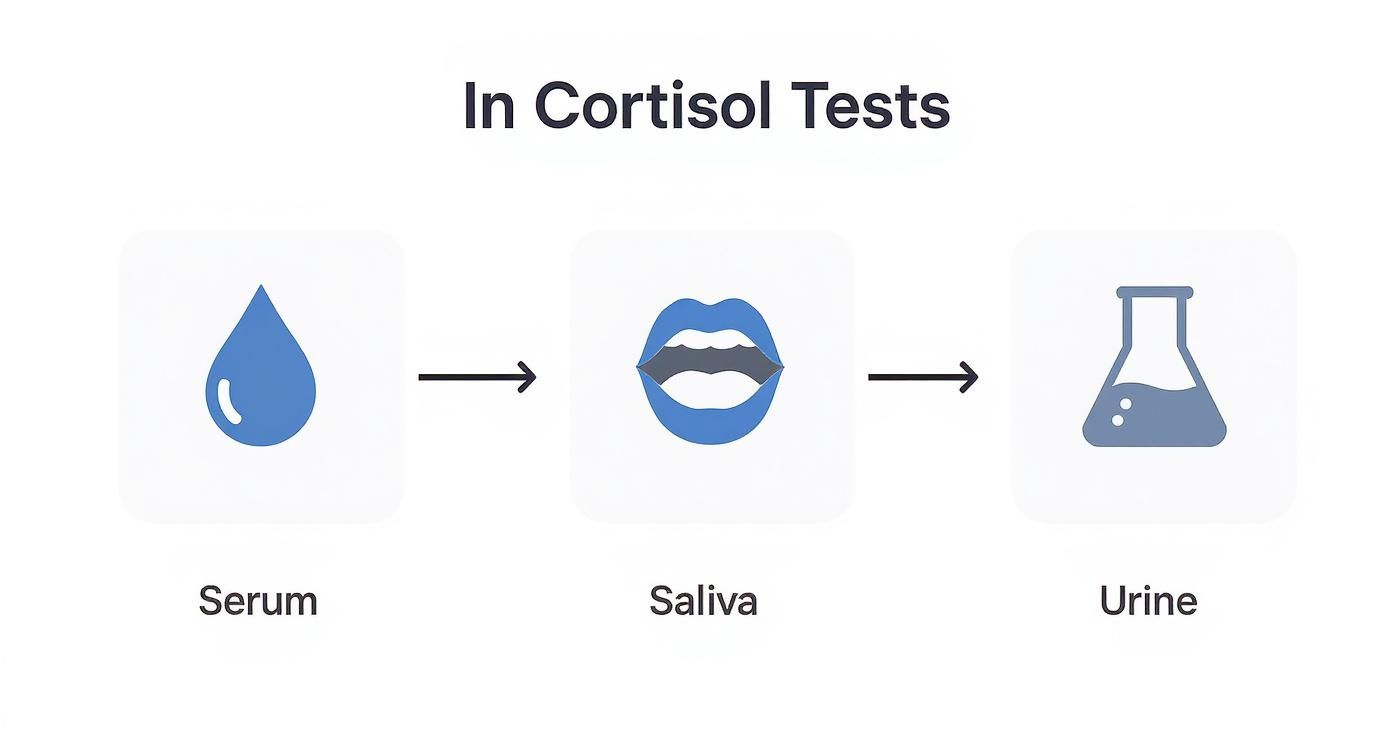Does Function Health test cortisol levels? Yes. This guide explains their cortisol testing, how to understand your results, and what steps to take next.

Let's cut right to the chase: Yes, Function Health absolutely tests for cortisol as part of its standard biomarker panels. Think of this test as more than just a number; it's a crucial window into your body's stress management system, influencing everything from your daily energy to how well your immune system holds up. Understanding your cortisol levels is a proactive step toward long-term health.

Function Health, a prominent company in direct-to-consumer lab testing, includes cortisol in their broad health panels. They specifically categorize it under Stress & Aging, which signals its importance as a key indicator of how your body is weathering the demands of daily life.
What makes their approach valuable is the context. Instead of just giving you a single cortisol number, they place it alongside dozens of other biomarkers. This allows you and their team to spot patterns and connections you might otherwise miss. If you're curious about the bigger picture, we have an in-depth analysis of whether Function Health's blood testing is worth it you can check out.
To give you a quick summary, here's a simple breakdown of what to expect when it comes to cortisol testing with Function Health. This table pulls together the key details in one easy-to-scan spot.
Ultimately, having this data point is an excellent starting place for understanding your body's response to stress and making informed lifestyle adjustments.
Important Disclaimer: This article is for informational purposes only. It is not a substitute for professional medical advice, diagnosis, or treatment. Always consult a qualified healthcare provider with any questions you may have regarding a medical condition.

Think of cortisol as your body’s own alarm clock and emergency response system, all rolled into one. It’s a critical steroid hormone produced by your adrenal glands that’s designed to prepare you for action and help you handle immediate challenges.
Cortisol's primary job is to orchestrate your body's response to anything it perceives as a threat, whether that's a near-miss in traffic or the pressure of public speaking.
But this internal alarm doesn't just go off randomly. It follows a predictable daily rhythm. For most of us, there's a natural cortisol surge first thing in the morning, an effect known as the Cortisol Awakening Response (CAR). This peak is what helps you wake up, feel alert, and get your day started. As the day goes on, these levels should gently fall, hitting their lowest point around midnight to help you wind down and sleep.
While cortisol is well-known for its role in the "fight-or-flight" response, its responsibilities go way beyond that. According to the National Institutes of Health (NIH), this powerhouse hormone is a key player in several other vital functions.
A short-term spike in cortisol is completely normal and can be beneficial—it sharpens your focus and prepares your body for what's next. The real trouble starts when that alarm gets stuck in the "on" position.
When stress becomes chronic and unrelenting, cortisol levels can stay consistently high, disrupting nearly every system in your body. This sustained state of high alert is linked to a host of long-term health issues, from metabolic problems to a weakened immune system.
Understanding this difference is critical. When you get a comprehensive test from a service like Function Health, you’re not just measuring "stress." You’re collecting crucial data on a hormone that influences your well-being from head to toe.
Disclaimer: This article provides information for educational purposes only and is not a substitute for professional medical advice. Always consult with a qualified healthcare provider before making any decisions about your health or treatment.
Not all cortisol tests are the same, and the right one depends on what your doctor is trying to learn. Think of it like using different tools for a job: sometimes you need a quick snapshot, other times you need a full-day recording. Understanding these differences is key to making sense of your results.
Function Health typically starts with a serum (blood) test. This is a standard method for many clinical situations because it captures a precise snapshot of your cortisol levels at the exact moment the blood is drawn. According to clinical guidelines from UCSF Health, normal morning cortisol levels in your blood typically fall between 5 to 25 mcg/dL (140 to 690 nmol/L), and Function Health’s ranges align with these widely accepted standards.
Beyond a standard blood draw, other common methods can give you a different kind of insight into your body’s stress response.
Choosing the right test really hinges on the specific health question you're trying to answer. For a deeper look at how different testing services stack up, you can compare Function Health vs. Everlywell's accuracy in our complete guide.
To make it even clearer, let's break down how these common testing methods compare side-by-side. Each has its place, and knowing the pros and cons can help you and your doctor decide on the best approach for your health goals.
Ultimately, each method tells a different piece of your health story. The serum test gives you that crucial snapshot, saliva testing maps your daily rhythm, and a 24-hour urine test reveals your total daily output. Working together, they can create a much fuller picture of your adrenal health.
In short: A blood test gives a snapshot, a saliva test shows your daily rhythm, and a urine test reveals the total output over 24 hours. Each method tells a different part of your health story.
Getting your Function Health results can feel a bit like trying to read a foreign language, but figuring out what your cortisol number means is simpler than you might think. Think of this single data point as a snapshot—a valuable clue into how your body's stress response system is functioning.
This number is your starting point for a productive conversation with your doctor. It doesn't tell the whole story on its own, but it’s a critical piece of the puzzle. Cortisol levels are measured against a reference range, which simply shows whether your result is high, low, or within the optimal zone for the specific time of day your sample was taken.
If your cortisol levels are consistently high, it can be a red flag. Chronically elevated results may point to persistent stress. In some cases, they might signal an underlying medical issue like Cushing's syndrome, a condition explained by the National Institute of Diabetes and Digestive and Kidney Diseases (NIDDK).
On the flip side, unusually low cortisol could suggest a problem like adrenal insufficiency, which happens when your adrenal glands are not producing enough of the hormone.
The different ways to measure cortisol—whether through blood, saliva, or urine—give us different perspectives.

As this shows, a blood draw gives you that key snapshot, while other methods can be used to track cortisol over longer periods for a more complete picture of your body's rhythm.
Disclaimer: This information is purely for educational purposes and is never a substitute for professional medical advice. A single lab result is just one piece of your health puzzle. Always discuss your Function Health test results, symptoms, and health history with a qualified healthcare provider to get an accurate diagnosis and the right next steps for you.
Your doctor will put your cortisol levels into the context of your overall health, lifestyle, and other biomarkers to really understand what they mean.

Alright, you've got your cortisol numbers from Function Health. That's a fantastic first step. But knowledge without action is just data sitting on a screen. The real value comes when you use those results to make meaningful, lasting changes that help your body's stress response system find its balance.
When it comes to managing cortisol, you'll want to lean on strategies that are backed by solid evidence. This usually means focusing on the big three: stress management, sleep, and nutrition. These are the same pillars of health you’ll hear experts from organizations like the American Heart Association talk about for a reason—they are effective.
By dialing in on these areas, you’re not just chasing a number on a lab report. You're building a solid foundation for better hormonal balance and a more resilient you.
So, how do you actually put this into practice? Consistency is everything. This is where a few simple, powerful habits can make all the difference, especially when you have tools to help them stick.
Here are a few core habits to get you started:
The goal isn't to eliminate stress—that’s not realistic. It’s about getting better at responding to it. Think of these habits as tools you’re giving your body to recover from stressors more efficiently.
Let’s face it, building new routines is tough. The right app can give you the structure and a little nudge of motivation to stay on track. Here are a few habit tracking apps to consider:
If you're curious what others are saying, check out these customer reviews of Function Health to see how people use apps to bring their health plans to life.
Disclaimer: Always consult with a healthcare provider before making significant changes to your diet, exercise routine, or lifestyle, especially when responding to lab test results.
Getting into the specifics of any health test can feel a little overwhelming. Let's break down some of the most common questions about cortisol testing so you know exactly what to expect and how to think about your results.
For a standard blood test, like the one Function Health provides, the sample is almost always taken first thing in the morning, usually around 8 AM.
This timing is everything. Cortisol naturally follows a daily rhythm, peaking shortly after you wake up. An early morning test catches this high point, giving a consistent and reliable baseline to evaluate your hormonal health. Your doctor or Function Health will give you specific instructions—follow them closely for the most accurate snapshot.
They absolutely can. Certain medications are well-known for affecting cortisol levels. This is especially true for corticosteroids like prednisone, but also estrogen and some antidepressants. It's crucial that you give your healthcare provider a complete list of every medication and supplement you're taking.
While a single meal probably won't throw your results off dramatically, your long-term eating habits and current stress levels definitely play a role in your body's overall hormone production.
As the Cleveland Clinic puts it best, being completely transparent with your doctor about your medications is vital because these substances can directly influence your test results.
The laboratory science behind the test is often identical—both use certified labs to perform the analysis. The real difference is in the "why." So when you ask does Function Health test cortisol levels, it helps to understand their philosophy.
Function Health focuses on prevention, bundling cortisol testing with over 100+ other biomarkers to give you a comprehensive look at your health from the inside out. A hospital test, on the other hand, is typically ordered by a doctor to investigate specific symptoms or a suspected medical issue. Both are valuable; they just serve different purposes on your health journey.
This is an incredibly common—and valid—experience. Think of a single blood test as a snapshot in time. It captures one moment, but it might not reflect the full, dynamic picture of your stress response throughout the day. Your feelings of stress are just as real and important as any number on a lab report.
A normal cortisol result doesn't mean what you're feeling isn't real. It simply suggests that one data point isn't telling the whole story. This is a perfect opportunity to talk with your doctor. They might suggest looking at your cortisol rhythm with a multi-point saliva test or simply recommend focusing on stress management techniques, regardless of what the lab work says.
Ready to turn your health data into sustainable habits? Heart Fit is an AI-powered app that transforms your action plan into a simple, motivating daily system. Track your nutrition, log stress-management activities, and build lasting routines that support your heart and hormonal balance. Start your free trial today and take control of your health journey.